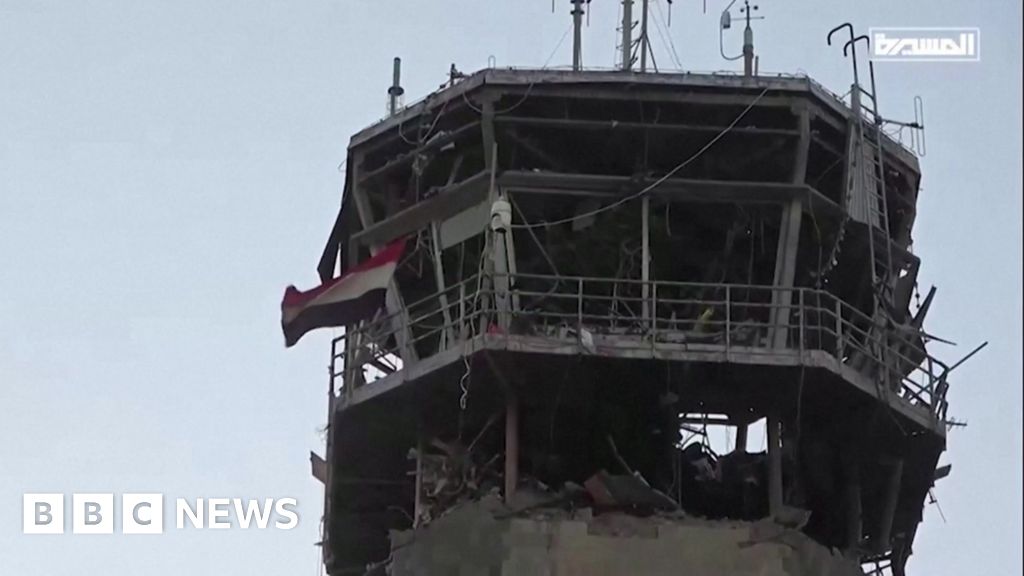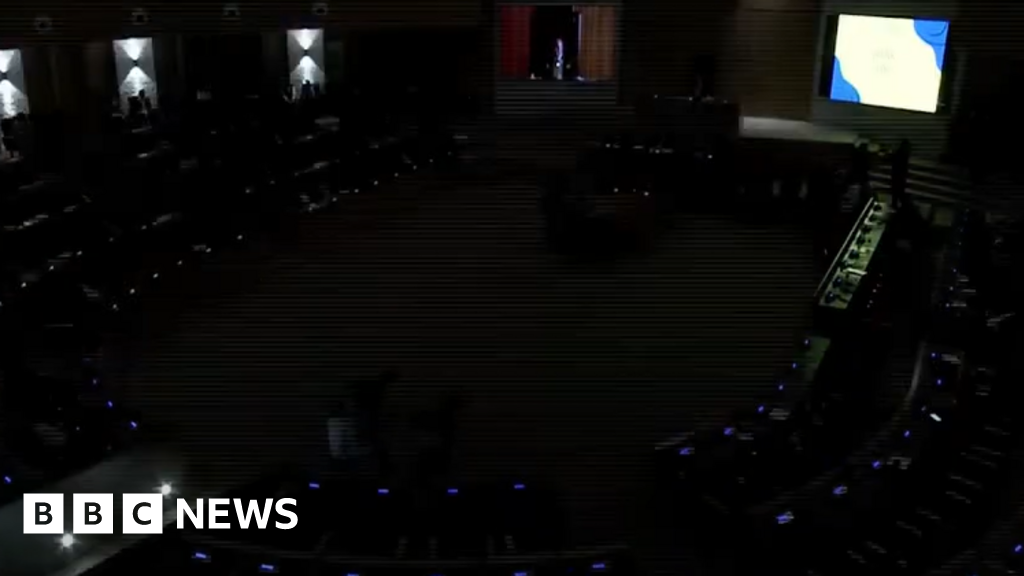PUTIN told tyrant Assad that he was going to lose before a plot was devised to smuggle him out of Syria, Kremlin insiders revealed.
The Russian dictator personally granted political asylum to Bashar al-Assad on Sunday after he was overthrown by rebels and forced to flee.
One of mad Vlad's allies have confirmed for the first time that Russia did help the shamed tyrant flee to Moscow.
The country's deputy foreign minister Sergei Ryabkov said that Assad had been transferred in the "most secured way" to his pal Putin's Russia.
He told NBC News: "He [Assad] is secured, and it shows that Russia acts as required in such an extraordinary situation."
When asked whether Moscow would hand Assad over to the International Criminal Court, the Putin puppet implied they wouldn't, defending that Russia "is not the party to the convention" that established it.
Russian government agents are said to have persuaded Assad to flee immediately as rebels continued to gain key cities across Syria as they believed he was set to lose the fight.
Russian intelligence agents organised the dramatic escape as they flew tyrant Assad out to Moscow via its air base on the Syrian coast, key sources told Bloomberg News.
The overthrown dictator was ordered to tell no-one, with the aircraft's transport switched off to avoid any kind of tracking.
There's even a chance that a military plane was used to transport the tyrant to safety.
It's understood that Putin personally approved Assad's rescue - much like he personally granted him political asylum.
But the Russian dictator apparently has no intention of meeting him now he is in exile - despite the pair being in the same country.
Shocking scale of Assad's atrocities as Syrian rebels find 40 tortured bodies in Damascus Morgue & haunting pics show piles of clothes
Putin has yet to speak publicly about the collapse of the Assad regime.
The Russian dictator was Assad's key ally during Syria's bloody civil war with the Kremlin aiding him in maintaining his family's horrific dynasty that had exercised control for over half a century.
Putin had gained a huge military presence in Syria with an air base in Latakia and a naval facility in Tartus.
Ryabkob added that he had "no idea" what was happening with Assad "right now", explaining that it would be "very wrong" to "elaborate on what happened and how it was resolved".
The flight-tracking website Flightradar24 showed a plane believed to be carrying Assad as he fled the Syrian capital Damascus in the early hours of Sunday morning.
The plane was spotted heading to the Mediterranean Sea, before it made a bizarre U-turn and vanished off the map.
Rumours into Assad's whereabouts and life swirled when it disappeared - with some believing that it had been shot down.
The Ukrainian Centre for Strategic Communication and Information Security claimed on X that Russia "hid their trail" in assisting al-Assad's escape by circulating fake claims that he died in a crash.
Reuters could not immediately ascertain who was on board the Ilyushin Il-76T - a type of plane used by the Russian military.
The flight dropped off radar at 5.29am - 40 minutes after takeoff - with altitude data showing it made a descent.
Two Syrian sources had suggested Assad could have been killed in a crash after the surprise U-turn and plunging altitude.
In a statement, Flightradar24 said the plane's signal was lost near Homs - but that could be because of an older transponder.
They said: "The aircraft was flying in an area of GPS jamming, so some data might be bad."
It was eventually confirmed that the Syrian dictator had made it safely to Russia.
Putin's press secretary Dmitry Peskov said this morning that Russia was in contact with the Syrian rebels over its military bases.
He said: "We, of course, maintain contacts with those who are currently controlling the situation in Syria.
"This is necessary because our bases are located there, our diplomatic mission is located there and, of course, the issue related to ensuring the security of these facilities is extremely important and of primary significance."
Inside Israel's Operation 'Bashan Arrow' during 48 hour explosive bombing campaign of Syria
Looking to maintain their luxurious lifestyle despite being in exile, the Syrian dictator and his family may be living in one of the 20 Moscow apartments his extended family own.
Purchased in the prestigious Moscow City district, the apartments are said to be worth more than £30 million in recent years, showing just how safe the Assad's are in their pal Putin's country.
The majority of the apartments are in the City of Capitals complex - a twin-towered skyscraper that sat once as the tallest in Europe.
It remains unclear whether the family will live in one of their luxurious, skyscraper apartments or whether they will be forced to stay in a government safehouse.
There is also speculation that Assad may have bought a mansion in or near St Petersburg ahead of his escape into exile.
Footage allegedly shows the inside of the Assad family's secret underground tunnel network.
Video apparently captured inside Major General Maher al-Assad's mansion reveals a white staircase leading down to a vast network of passages.
It was reportedly filmed by one of the rebels responsible for storming capital Damascus and looting the Assad homes this weekend.
Astonishing footage shows the tunnel complex with high arched ceilings, fluorescent lighting, electronic doors and huge rooms.
A fully kitted-out kitchen complete with Pepsi cans and Tetley tea, a modern sitting room and bathroom and discarded shopping bags could be seen.
The video was allegedly filmed underneath his mansion in Damascus.
It was captioned: "Massive tunnel complex beneath Maher Assad's mansion, wide enough for trucks carrying Captagon and gold to drive through."
The Assad Dynasty
THE Assad dynasty in Syria began with Hafez al-Assad - who seized power in 1971 through a military coup and established an authoritarian regime.
His rule focused on centralised government control, military strength, and the suppression of dissent, aligning Syria closely with the Soviet Union and maintaining an anti-Israel stance.
Upon Hafez's death in 2000, his son Bashar al-Assad succeeded him.
Initially, there were hopes for reform under Bashar, but these hopes faded as he continued his father's repressive policies.
The situation worsened in 2011 with the Syrian Civil War, part of the Arab Spring, marked by brutal crackdowns on protestors.
Following years of humanitarian crisis and international condemnation, Assad was overthrown - despite having support from Russia and Iran.
After seizing Damascus in a swift and decisive offensive, rebel forces declared victory and announced that the city was "free of Assad."
The dictator fled the capital on Sunday, reportedly aboard a plane that disappeared from radars.
He has been given refuge in Moscow and is currently under Russian protection.
The collapse of Assad's regime ignited celebrations across Syria.
In the capital, thousands poured into the streets, waving rebel flags and lighting flares.
Statues of Assad and his late father, Hafez, were toppled in symbolic acts of defiance.
The Assad dynasty has profoundly shaped Syria's modern history through its authoritarian rule and the ongoing conflict.






















 English (US) ·
English (US) ·